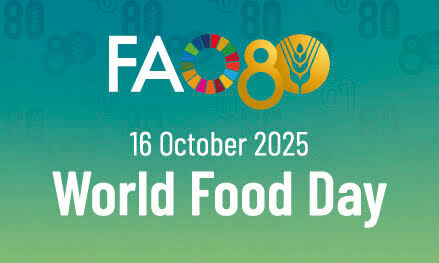Nutrition and Wellness experts have sounded a compelling alarm, praying for unification strategies to convert Africa’s vast bank of natural herbs and foods into scientifically–structured, and sustainable wellness solutions.
This was solicited during a virtual session organized by Wholeeats Africa, to commemorate 2025 World Food Day, a webinar that assembled nutritionists, researchers and entrepreneurs, discussing how Africa can harness its enabling agricultural resources to advance health outcomes, while moving forward sustainable food systems on the continent.
With the United Nations Food and Agriculture Organisation choosing every 16 October as World Food Day in 1979, this year’s edition themed: “Hand in Hand for Better Foods and a Better Future,” providing a backdrop for discussions that concentrated on pragmatic action.
Delivering her speech during the webinar, Oluwakemi Jeje, the Founder of Wholeeats Africa, highlighted the urgent need to prevent the “abuse of herbs” and instead called to replace it with harnessing their benefits.
Ms Jeje lamented the severe loss in terms of “chronic illnesses and preventable deaths” due to the current lack of proper integration and understanding. “Africa is one of the richest continents when it comes to herbs, and I desire that we integrate this into our system,” she stated.
Other speakers featured in the session who addressed critical pillars for the proposed transformation are Nutritional Consultant Stella Nwoke, Margaret Ilomuanya, an Associate Professor of Pharmaceutics at University of Lagos, and Adeolu Akinyemi, an established entrepreneur from Nigeria.
Emphasising on the reasons food should be treated as medicine, Mrs Nwoke advocated for a return to foundational dietary principles, urging Africans to embrace local natural foods as preventive medicine.
“Living well means understanding your individuality, knowing what works for your body and maintaining balance across nutrition, fitness, sleep, stress, and love,” she said, pointing to the significant disease-preventing properties of indigenous foods such as bitter leaf, beans, and moringa.
From the part of Ilomuanya, the Associate Professor strengthened that global acceptance of African herbs heavily depends on the continent’s ability to convince the world through rigorous scientific research.
“Our local herbs have immense therapeutic value, but we need more research to prove efficacy and standardize them for global markets,” Professor Ilomuanya asserted.
The Professor further inferred the success of India and China, who cemented global trust in their natural products through effective documentation and presentation of their research to the world,” stressing that “Africa must do the same.”
From a business perspective, Mr Akinyemi identified partnership as the non-negotiable key to unlocking the sector’s potential.
“Entrepreneurs, researchers, and nutritionists must work hand in hand to identify pain points, validate solutions, and deliver access,” Mr. Akinyemi said. He challenged attendees to consider, “How we can turn these natural products into refined, market-ready solutions.”
He concluded that such a collaborative ecosystem—linking farmers, researchers, and innovators—is capable of multiplying both the health and wealth of the continent.

